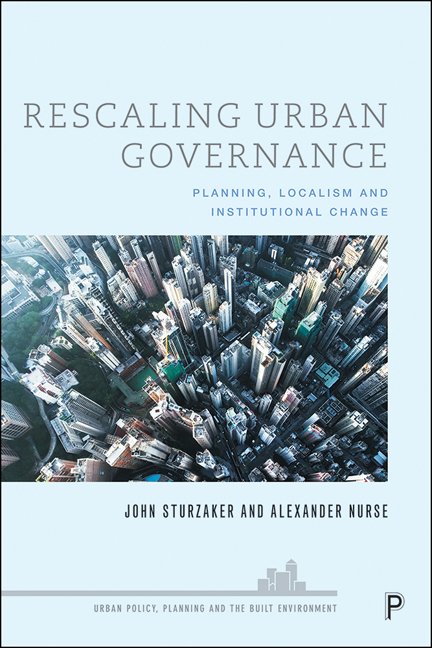Book contents
- Frontmatter
- Dedication
- Contents
- List of Tables, Figures and Boxes
- Notes on Authors
- Glossary
- Acknowledgements
- 1 Introduction: Planning Reform and State Spatial Rescaling
- 2 Devolution: A Patchwork Quilt of Planning Reform
- 3 Replacing the Regions: The evolution of English Subnational Reform
- 4 City Regions and the Cities Within Them: Connecting two Overlapping Scales
- 5 Local Authorities: Powerhouses or Scapegoats?
- 6 Community-led Governance: Opportunities and Constraints
- 7 Conclusion: Rescaling Urban Governance
- References
- Index
5 - Local Authorities: Powerhouses or Scapegoats?
Published online by Cambridge University Press: 03 March 2021
- Frontmatter
- Dedication
- Contents
- List of Tables, Figures and Boxes
- Notes on Authors
- Glossary
- Acknowledgements
- 1 Introduction: Planning Reform and State Spatial Rescaling
- 2 Devolution: A Patchwork Quilt of Planning Reform
- 3 Replacing the Regions: The evolution of English Subnational Reform
- 4 City Regions and the Cities Within Them: Connecting two Overlapping Scales
- 5 Local Authorities: Powerhouses or Scapegoats?
- 6 Community-led Governance: Opportunities and Constraints
- 7 Conclusion: Rescaling Urban Governance
- References
- Index
Summary
Introduction
It has been argued that the reforms to governance in England since 2010, and the intensified focus on both city regions and neighbourhoods that have resulted (see Chapters 4 and 6 respectively) have, in turn, led to a loss of focus on the tier of governance in between these two – that of local authorities (Lowndes and Gardner, 2016). At the same time, the massive cuts in public spending consequential on ‘austerity’ are both exacerbating the problems local authorities have to deal with, such as social and welfare issues, and also limiting their scope to deal with them as their budgets have been severely reduced (Lowndes and Pratchett, 2012). So a great deal of power and responsibility remains at local authority level. Before exploring the parameters of this power and responsibility, it is necessary to consider some definitional issues.
First is the question of scale. In this chapter we are dealing with what are referred to as municipalities in other countries. As discussed in Chapter 1, there are theoretical arguments against ‘territorial’ thinking, and the imposition of boundaries on places that are rendered false by ‘the multiplicity of connections formed across them’ (Cox, 2013, p 49). However, while lived experiences may be increasingly relational rather than territorial (Harvey, 1989; MacLeod and Jones, 2011), local authorities remain a fixture in urban governance, as they have for more than 100 years (John, 2014), and it is to ‘the council’ that most residents of UK cities instinctively first turn to deal with problems faced in day-to-day life.
A related scalar issue is that of the significant variability in size of urban areas represented by local authorities: the population size of local authorities on the English mainland, for example, ranges from 7,500 to 1.1 million, and population density from 24 to 13,700 people per square kilometre (ONS, 2018). In this book we have primarily focused on the ‘more urban’ parts of the country, that is, the largest (in terms of population) and most dense towns and cities. We maintain that focus in this chapter, being principally interested in the 74 urban areas in England with more than 100,000 people (Pike et al, 2016).
- Type
- Chapter
- Information
- Rescaling Urban GovernancePlanning, Localism and Institutional Change, pp. 99 - 122Publisher: Bristol University PressPrint publication year: 2020



